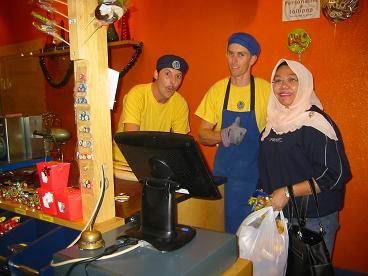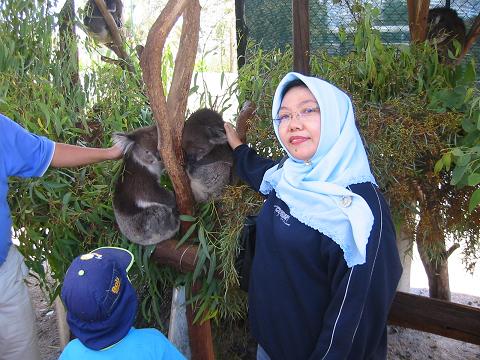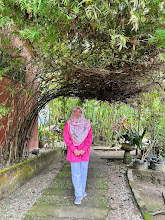WELCOME TO MY BLOG...
Hi there! Thank you for taking the time to drop by... I hope your visit here would a fruitful one and that you have found what you're looking for. This blog was created especially for primary school teachers and pupils in an effort to help them in their pursuit towards excellence in the Science subject with the UPSR exam as the final destination. It is also meant for parents whom I hope might find some of the information here useful to help your children to do well in the subject. Nevertheless, if what you're looking for is not here, please be free to post me a note and I'll try to make up whatever necessary to meet your expectations. Have a nice day.....!
ABOUT MYSELF
I received my Diploma in Mathematics/Physics with Education from Universiti Teknologi Malaysia and then my Degree in Education (Science) with Honours from Open University of Malaysia.
I have been in the teaching profession since 1982 and had since taught in a number of secondary schools before being promoted as the headmistress of a primary school in 1992. Since then, I have been the head of three primary schools.
I have been appointed as the Central Master Trainer to train primary school teachers when Science was first introduced in the primary school level. Since then, I have been quite active in the development of Teaching and Learning of Science at the National, State and District levels. I have also often been invited to give talks to schools to assist UPSR candidates in enhancing their understanding in the Science Process Skills involving the Section B part of the UPSR exam paper.
Being chosen as one of the seven Malaysian delegates to visit Indonesian schools to study a special twinning programme between the Indonesian and Germany Education Ministry had been one of the higlights in my teaching career.
I have been in the teaching profession since 1982 and had since taught in a number of secondary schools before being promoted as the headmistress of a primary school in 1992. Since then, I have been the head of three primary schools.
I have been appointed as the Central Master Trainer to train primary school teachers when Science was first introduced in the primary school level. Since then, I have been quite active in the development of Teaching and Learning of Science at the National, State and District levels. I have also often been invited to give talks to schools to assist UPSR candidates in enhancing their understanding in the Science Process Skills involving the Section B part of the UPSR exam paper.
Being chosen as one of the seven Malaysian delegates to visit Indonesian schools to study a special twinning programme between the Indonesian and Germany Education Ministry had been one of the higlights in my teaching career.
VISIT TO PERTH

Feeding the kangaroo..

At a candy factory..
Saturday, June 20, 2009
SRI ABIM
On 20 June 2009 I was invited to give a talk on the answering techniques at SRI ABIM. The audience consisted of the school's UPSR candidates and some from nearby schools totalling to about 120 students. In general, the participation from the students were okay as they were willing to try to answer the questions asked. Any inaccurate answer was discussed so as to highlight to the students to prevent them from making the same mistake in future. We sang a few science songs together to liven up the session and also to avoid students from getting bored and sleepy, especially after a short recess with nasi lemak. As usual, after the session the students were eager to geta my autograph, email etc. Anyway, I wish them all the best and may the majority of them get an A for their Science paper. Good luck children..!!
Wednesday, June 17, 2009
OVERVIEW OF FORMAT OF PAPER
The UPSR Science paper consists of 2 sections, A and B.
Section A consisting of 30 multiple choice questions test students of their scientific facts and concepts that they learnt from Year 4 to 6. Students are required to memorise and understand these facts and concepts so as to be able to answer the questions in this section successfully. We can say that questions in this section are recall questions whereby students just recall the necessary scientific fact/concept to answer those questions. Nevertheless, although they are basically multiple choice questions, they are presented to the candidates in quite a number of ways (10 to be exact!) by which each of these has different level of difficulty. This is based on the Bloom's Taxanomy. The basis for the assessment in this section is the 5 themes in the science syllabus.
In contrast with Section A, Section B is a totally different kind of assessment. This section requires students to use their thinking skills to produce the most appropriate answer. Information and data are readily given in the question and students have to analyse these to come out with the best answer. The basis for the assessment in this section is the Science Process Skills which I've listed in my earlier post.
So, as you can see Section A requires students to give the information needed while Section B requires students to use/analyse the information given and then come out with the best answer for the question asked.
Section A consisting of 30 multiple choice questions test students of their scientific facts and concepts that they learnt from Year 4 to 6. Students are required to memorise and understand these facts and concepts so as to be able to answer the questions in this section successfully. We can say that questions in this section are recall questions whereby students just recall the necessary scientific fact/concept to answer those questions. Nevertheless, although they are basically multiple choice questions, they are presented to the candidates in quite a number of ways (10 to be exact!) by which each of these has different level of difficulty. This is based on the Bloom's Taxanomy. The basis for the assessment in this section is the 5 themes in the science syllabus.
In contrast with Section A, Section B is a totally different kind of assessment. This section requires students to use their thinking skills to produce the most appropriate answer. Information and data are readily given in the question and students have to analyse these to come out with the best answer. The basis for the assessment in this section is the Science Process Skills which I've listed in my earlier post.
So, as you can see Section A requires students to give the information needed while Section B requires students to use/analyse the information given and then come out with the best answer for the question asked.
Thursday, June 11, 2009
Karnival Sains dan Teknologi Negeri Selangor
Hmm.. Hari ni terima faks kena jadi hakim Saintis Muda peringkat negeri Selangor di Sabak Bernam pada 23 - 25 Jun 2009. Nak kena call urusetia untuk urusan penginapan. Nampaknya tahun ni pengurusan di pihak urusetia lain la pulak... 23 hb baru nak pilih soalan dan uji ekperimen.. Cukup ke radas/bahan yang diperlukan??? Sebelum ni kita dah siap set, uji dan senaraikan bahan/radas yang diperlukan awal2 supaya sekolah tuan rumah dapat buat persediaan sewajarnya. Ini sehari sebelum pertandingan baru nak test.. Mudah2an tak kecoh nanti dan harapnya semua berjalan lancar...
Answering Techniques
Last Sunday, I gave a talk to the UPSR candidates of SK Jalan Kuantan 2, KL. The school is located right in front of the Lake Titiwangsa. On that very same day, something was going on at the lake, resulting in quite a massive traffic jam and all the parking lots were taken. Lucky for me I was granted entrance into the school compound by the school guard and hence found no problem in parking my Persona. In general, the pupils were well-behaved and quite responsive. There was even an Iraqi pupil (I think...) whom I thought would be one of the school's targeted 5As students. Hmm... mungkin lepas ni rehat kejap kot.. sebab slot untuk Adab Utusan Malaysia dimaklumkan akan bermula Julai nanti. SK Taman U ada call tp sampai kini belum faks lagi surat panggilan rasmi.
Friday, May 8, 2009
Answering Techniques - Science UPSR
Today 8 May 2009, I gave my pupils a talk on the answering techniques of the Science UPSR paper. It took me from 8.30 am to 12.00 pm to deliver the talk, making sure that my pupils really comprehend the answering techniques required to excell in their coming Mid Year Science paper.
My only hope is that our UPSR Science result this year will be as good, if not better, as last year's...
My only hope is that our UPSR Science result this year will be as good, if not better, as last year's...
Thursday, April 9, 2009
SCIENCE PROCESS SKILLS
Terdapat 12 kemahiran proses sains yang perlu dikuasai oleh murid dalam pembelajaran Sains sekolah rendah. Kemahiran-kemahiran tersebut adalah:
1. Observing
2. Making inferences
3. Classifying
4. Measuring and using numbers
5. Predicting
6. Communicating
7. Using space and time relationship
8. Defining operationally
9. Interpreting data
10. Controlling variables
11. Making hypothesis
12. Experimenting
5 daripada kemahiran di atas diuji dalam kertas bertulis UPSR (Section B) manakala yang lainnya dalam PEKA Sains secara berterusan. 5 kemahiran yang diuji dalam peperiksaan UPSR adalah:
1. Observing
2. Making inferences
3. Classifying
4. Measuring and using numbers
5. Predicting
6. Communicating
7. Using space and time relationship
8. Defining operationally
9. Interpreting data
10. Controlling variables
11. Making hypothesis
12. Experimenting
5 daripada kemahiran di atas diuji dalam kertas bertulis UPSR (Section B) manakala yang lainnya dalam PEKA Sains secara berterusan. 5 kemahiran yang diuji dalam peperiksaan UPSR adalah:
- Making inferences
- Predicting
- Interpreting data
- Controlling variables
- Making hypothesis
Subscribe to:
Comments (Atom)




